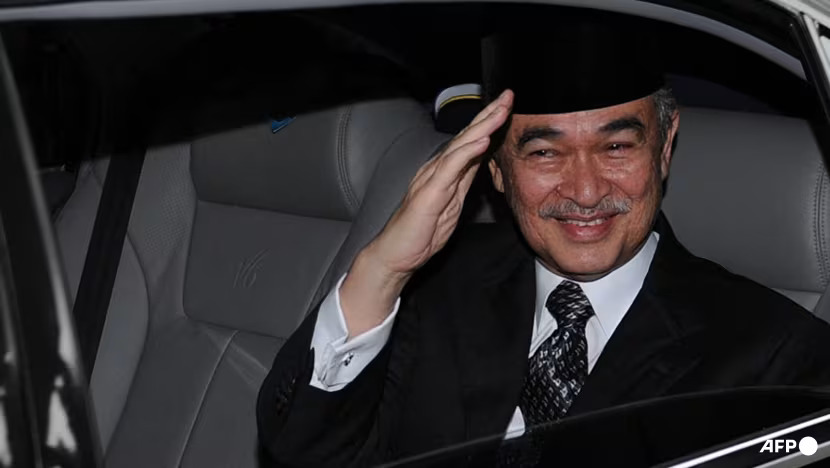Malaysia's former Prime Minister Abdullah Ahmad Badawi dies, aged 85

(Photo credit: AFP/Saeed Khan)
Source: Channel News Asia
Former Malaysian Prime Minister Abdullah Ahmad Badawi died on Monday (Apr 14) at the age of 85.
Affectionately known as Pak Lah, Abdullah became Malaysia's fifth prime minister in 2003, following the resignation of veteran leader Mahathir Mohamad after 22 years at the helm.
He died at the National Heart Institute in Kuala Lumpur at 7.10pm, his son-in-law and former health minister Khairy Jamaluddin announced in an Instagram post.
Abdullah was admitted on Sunday morning after experiencing breathing difficulties and was immediately placed under intensive care, the institute said in a statement.
"Despite all medical efforts, he passed away peacefully, surrounded by his loved ones," it added.
Paying tribute to Abdullah, the institute said he was a leader who brought "calm and compassion to public service".
"His contributions to the country, especially in fostering unity and good governance, will always be remembered with deep respect and admiration," it added.
Prime Minister Anwar Ibrahim hailed Abdullah's accomplishments.
"Pak Lah taught us the meaning of humanity in leadership," he said in a Facebook post, adding that the former prime minister was not just a leader, but also a person with a "big heart".
Anwar noted that Abdullah was always the calming presence amid the tumult of politics, and always extended courtesy even when they were in opposing camps.
"That's how big the soul of a great statesman is," he said.
Singapore Prime Minister Lawrence Wong expressed his condolences to the people of Malaysia.
"During his six years as prime minister, Tun Abdullah made significant contributions to Malaysia’s social and economic development," said Mr Wong, adding that Abdullah was a respected leader who helped ASEAN "stand tall in the world".
Mr Wong said that Singapore was "fortunate to count Tun Abdullah as a friend".
"Working with him, we deepened cooperation in areas of mutual interest, such as the development of Iskandar Malaysia, and made good progress on bilateral issues.
"This laid the strong foundation for our countries’ excellent ties today."
PAK LAH
Abdullah was born in Penang in 1939. He was the eldest child of four children to Khailan Hassan and Ahmad Badawi, a prominent religious and political figure in the United Malays National Organisation (UMNO) party.
Abdullah, a scholar in Islamic studies at the University of Malaya, began his career as a diplomatic officer and civil servant in 1964. The following year, he married Endon Mahmood with whom he had two children.
He entered politics in 1966, but took on a more active role in UMNO after his father's death in 1977.
In 1978, he ran for a parliamentary seat in the Kepala Batas constituency in his home state and won by a majority of 5,029 votes.
Three years later, he was appointed to the Cabinet under Mahathir, serving as minister in the Prime Minister's Department.
He would go on to hold several more Cabinet roles under Mahathir. Abdullah was named as deputy prime minister in 1999, following the shock ouster of Mahathir's previous deputy, Anwar, who in 1998 was charged with corruption and sodomy. Critics say the charges were politically motivated.
In 2003, Mahathir stepped down, and Abdullah, his handpicked successor, became Malaysia's fifth prime minister.
In general elections held the following year, Abdullah received widespread support, campaigning on a vow to attack poverty and to eliminate the cronyism and corruption that had been a byword of Mahathir's long tenure.
He also espoused a moderate version of Islam that aimed for economic and technological progress over religious fundamentalism. But he came under public criticism for his review of fuel subsidies that saw a sharp spike in prices.
Abdullah stepped down in 2009, a year after an election that saw the then-ruling Barisan Nasional coalition lose its parliamentary supermajority for the first time in the country's history. He was succeeded by Najib Razak.
Concerns about Abdullah's health mounted in recent years and Khairy revealed in September 2022 that Abdullah had dementia.
The announcement was made after a family discussion, as many people were asking about the former leader’s health, he said at the time.
Khairy said Abdullah did not remember the names of family members, had difficulty speaking and was also wheelchair-bound.
